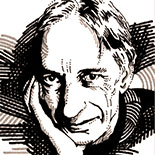 Ivan Illich (September 4, 1926 – December 2, 2002) was an Austrian philosopher, Roman Catholic priest, and “maverick social critic” of the institutions of contemporary Western culture and their effects on the provenance and practice of education, medicine, work, energy use, transportation, and economic development.
Ivan Illich (September 4, 1926 – December 2, 2002) was an Austrian philosopher, Roman Catholic priest, and “maverick social critic” of the institutions of contemporary Western culture and their effects on the provenance and practice of education, medicine, work, energy use, transportation, and economic development.
The book that brought Ivan Illich to public attention was Deschooling Society (1971), a radical critical discourse on education as practised in “modern” economies. Giving examples of what he regards as the ineffectual nature of institutionalized education, Illich posited self-directed education, supported by intentional social relations, in fluid informal arrangements:
Universal education through schooling is not feasible. It would be no more feasible if it were attempted by means of alternative institutions built on the style of present schools. Neither new attitudes of teachers toward their pupils nor the proliferation of educational hardware or software (in classroom or bedroom), nor finally the attempt to expand the pedagogue’s responsibility until it engulfs his pupils’ lifetimes will deliver universal education. The current search for new educational funnels must be reversed into the search for their institutional inverse: educational webs which heighten the opportunity for each one to transform each moment of his living into one of learning, sharing, and caring. We hope to contribute concepts needed by those who conduct such counterfoil research on education–and also to those who seek alternatives to other established service industries.
The last sentence makes clear what the title suggests—that the institutionalization of education tends towards the institutionalization of society and that ideas for de-institutionalizing education may be a starting point for a de-institutionalized society.
The book is more than a critique—it contains suggestions for a reinvention of learning throughout society and lifetime. Particularly striking is his call (in 1971) for the use of advanced technology to support “learning webs.”
The operation of a peer-matching network would be simple. The user would identify himself by name and address and describe the activity for which he sought a peer. A computer would send him back the names and addresses of all those who had inserted the same description. It is amazing that such a simple utility has never been used on a broad scale for publicly valued activity.